Announcements
Brenton Cooper, neurosicence professor, recently co-authored a research paper with University of Utah professor Franz Goller and University of Buenos Aires professor Gabriel Midlin on cowbirds’ vocal behavior. The findings revealed a complex system of sound production that allows the birds to create a “watery” noise. Researchers can apply these findings to studies of vocal imitation learning in other animals, including humans.
Davis College of Science & Engineering is proud to recognize Lindsey Elliott ’18, who has been included in the prestigious Forbes 30 Under 30 list.
While at TCU, Elliott double majored in mechanical engineering and mathematics and was a John V. Roach Honors College Laureate. She is now the founder of Nexterity, a robotics manufacturer developing a hands-free unbolting tool designed to improve both speed and safety in industrial settings.
Texas Christian University announced that the College of Science & Engineering (CSE) will be named the Louise Dilworth Davis College of Science & Engineering in honor of Louise Dilworth Davis ’77 and her extraordinary generosity to the university and the college. Louise Dilworth Davis of San Antonio has given $40 million, the largest philanthropic investment in the college’s 25-year history, to support CSE's strategic plan and operations in perpetuity. The gift will also endow the deanship, which will now be named the Louise Dilworth Davis Dean.
The Karyn Purvis Institute of Child Development (KPICD) is celebrating its 20th anniversary, and the Tarrant County Commissioners Court is recognizing its impact on the Fort Worth Community with a proclamation issued by Roderick Miles Jr. of Precinct 1 on Nov. 11. The proclamation highlights KPICD’s local and global impact through Trust-Based Relational Intervention® (TBRI®) and honors the legacy of Dr. Karyn Purvis and Dr. David Cross. The proceedings are open to the public, and all local KPICD staff are encouraged to attend. The brief recognition will take place at 10:00 a.m. in the Commissioners Courtroom, Tarrant County Administration Building, located at 100 East Weatherford Street, 5th Floor, in Fort Worth.
Dr. Zygmunt (Karol) Gryczynski, “Tex” Moncrief Jr. Chair and Professor of Physics and Astronomy, recently published findings in ACS Nano revealing nanoscale differences in the viscosity of mucus produced by cystic fibrosis patients compared to healthy individuals. His research offers valuable insights into the molecular behavior of cystic fibrosis and potential paths for improved treatment strategies.
John Brannon, a doctoral student in Physics and Astronomy, recently collaborated with leading scientists in Poland and Czechia through a research-focused trip abroad. His work at the Institute of Low Temperature and Structure Research led to the development of a new microwave synthesis method for ZnO microparticles, while his time at CEITEC Nano in Brno expanded his expertise in nanotechnology under the mentorship of Dr. Viktor Danchuk.
The Department of Psychology welcomes Dr. Tracy M. Centanni, associate professor at the University of Florida, for a lecture on the development of reading networks in the brain and new insights into dyslexia. The event will take place on September 5 from 1:00 to 2:00 p.m., followed by engagement with graduate students and colleagues from 2:15 to 3:00 p.m. in Rees-Jones Hall, Rm. 210.
Nutritional Sciences assistant professor McKale Montgomery, Ph.D, RD recently published a new article titled "TP53 Expression Status Alters Hemoglobinzation and Ferroptosis Sensitivity in K-562 Cells" in the International Journal of Molecular Sciences. The study explores how changes in TP53 expressionn influence hemoglobin production and ferroptosis sensitivity in K-562 cells, providing new insights into potential therapeutic strategies. Read the full article here.
TCU Pre-Health alumna Dr. Kaitlyn Upton '16 is currently completing a prestigious fellowship in zoo medicine at the National Aquarium in Baltimore, where she works with a diverse array of aquatic and terrestrial species. During a recent trip to the East Coast, TCU’s Director of the Pre-Health Professions Institute, Dr. Matt Chumchal, had the opportunity to reconnect with Dr. Upton.
While a senior veterinary student, she earned the American College of Veterinary Internal Medicine (ACVIM) Clinical Excellence Award, an honor given to only 82 students nationwide each year. In fact, the year she won, she was one of just two TCU alumni to receive the award, underscoring the university’s strong tradition of preparing future leaders in veterinary medicine.
From her early days as a Horned Frog to her current role caring for some of the ocean's most remarkable creatures, Dr. Upton continues to exemplify the CSE spirit of curiosity and commitment to make a difference in the world.
Rhiannon Mayne, Ph.D, Environmental & Sustainability Science professor and curator of TCU’s Monnig Meteorite Collection, has been honored with the 2025 Meteoritical Society Service Award — one of only five awards the Society presents each year. This prestigious recognition celebrates her outstanding leadership, service, and dedication to advancing meteoritics and planetary science.
After earning her Ph.D. from the University of Tennessee, Dr. Mayne completed a postdoctoral fellowship at the Smithsonian’s National Museum of Natural History before joining TCU in 2009 as the Oscar and Juanita Monnig Endowed Chair of Meteoritics and Planetary Science.
Over the past 16 years, she has transformed the Monnig Collection from fewer than 1,400 classified meteorites to more than 2,500 new additions, all while expanding public access and engagement. Her commitment to education and outreach has inspired thousands, from visitors to the Monnig Gallery to audiences at community events.
Chemistry professor Kayla Green has been awarded a competitive WelchX Pilot Grant, presented by The Robert A. Welch Foundation. In collaboration with Dr. Samantha Kristufek of Texas Tech University, Dr. Green will lead a research project focused on the development of innovative, recyclable materials for the recovery of critical metal ions, a promising direction with implications for both advanced technologies and environmental sustainability. The department also celebrates Professor and Department Chair Benjamin Janesko, who was named a WelchX grant recipient as well.
This summer, biophysics Ph.D. student Ugur Topkiran is working as a visiting researcher at the Howard Hughes Medical Institute’s Janelia Research Campus, one of the world’s leading centers for neuroscience. Under the guidance of Dr. Abraham Beyene, he is studying how dopamine, a key brain chemical, is released from neurons. Using advanced tools such as multiphoton microscopes and nanosensors called carbon nanotubes, Topkiran’s research contributes to a better understanding of how brain cells communicate.
In response to the recent flooding in Central Texas, the Karyn Purvis Institute of Child Development (KPICD) at TCU is offering free access to its TBRI® 101 online course. This trauma-informed training is designed to support professionals such as caregivers, educators and service providers working with children who have been impacted. The self-paced course offers practical tools to help build safety and navigate trauma during times of crisis. Visit child.tcu.edu/flood-support to learn more and sign up.
The Department of Psychology’s Psi Chi International Honor Society chapter has been recognized as a Model Chapter by the Psi Chi Central Office. Among more than 1,150 chapters worldwide, only 40 were selected for this honor. This marks the chapter’s second national recognition this semester. Earlier this year, the chapter also received a Psi Chi Activity Grant, which supported a student-organized career panel featuring professionals from applied psychology fields.
CSE Pre-Health graduate Anna Kwong ’25 recently captured national titles in both the women’s 1-meter individual and synchronized 3-meter events at the USA Diving National Championships and World Qualification Meet in Auburn, Alabama.
Anna earned 534.85 points in the 1-meter individual to claim her first national title in that event, securing her spot at the 2025 World Championships in Singapore, set for July 26. She ended her national championship appearance third-place finish in the 3-meter individual and will serve as the first alternate for the event at Worlds.
Since 1954, TCU has recognized individuals who exemplify the university’s values through exceptional service and leadership. Dr. Clark Jones ’89, ’92, a dedicated educator and leader within the TCU community, was honored for his decades of commitment to teaching, mentorship, faculty governance, and philanthropic support. His contributions have strengthened the university’s academic mission and advanced initiatives that reflect TCU’s impact locally and beyond.
Among this year’s honorees is Anton Naumov, recognized for his outstanding contributions to research and creativity. Dr. Naumov has established a one-of-a-kind near-infrared laboratory, the only one in Texas. His work exemplifies TCU’s teacher-scholar model, bringing distinction to the university and enriching student learning through his innovation.
Audrey Dolt (Biology BS ‘25) presented her research from the Stewart Lab on the development of an in vitro system to investigate inherited variants of the tumor suppressor BRCA1. Nick Boehly (Neuroscience BS ‘25) represented the Hale and Chumley Labs with his research on the effects of diet on the epigenetic factors contributing to Alzheimer’s disease. These presentations were coauthored by additional TCU students: Jamison Speed (Biology MS ’26), Bridey Brown (Biology MS ’24), Chrissy Baker (Biology MS ’24), Precious Grace Castillo (Chemistry BS ’24), Hayes Martin (Biology BS ’24), and Emersyn Jorski (Biology BS ’24). Several biology students (Ibukin Alausa, Delaney Davis, Izzie Galvan, Jackie Ha, Lexi Winter, and Troy Zambak) also contributed to a presentation of the TCU Chem Club project called “Don't spill the tea (or the chemicals): a safety initiative at TCU” mentored by Dr. Green.
We are proud to share that the TCU Pre-Health Professions Institute has been awarded the Texas Health Education Service Award for Innovation in Outreach! Led by Matt Chumchal, Ph.D., director of the Pre-Health Professions Insitutute, this collective effort features mentoring programs for middle and high school students and a mini-medical school summer camp partnership with the Andrews Institute and TCU Burnett School of Medicine. This honor recognizes the commitment to expanding access to healthcare careers for economically disadvantaged students that have been historically underrepresented in medicine.
Elisa Marroquin was awarded The Texas Academy of Nutrition and Dietetics Bluebonnet Award. This award honors an individual who is not a dietitian, but who has made a significant contribution to the promotion, recognition or progress of nutrition and dietetics in Texas. The nominee may be active in public policy, public service, research, media or other areas that impact nutrition and dietetics.
Dr. Eugenia Cheng
Scientist In Residence at the School of the Art Institute of Chicago
Honorary Visiting Fellow of City, University of London
Where does math come from: from rules in a textbook? From logic and deduction? Not quite. In this talk Eugenia Cheng will argue that math comes from human curiosity - most importantly, from asking questions. Many people are discouraged from asking these questions in school, thinking they’re too simple to be taken seriously, or being told that their questions are stupid. But often, these simple-sounding questions lead to wondrous mathematical revelations. Dr Cheng will take us on a journey of discovery starting with questions like "Why does 2x3 = 3x2?" and "What's the point of maths?", leading us into research-level abstract mathematics. The journey will take us via food, music, hair-styles, and other unexpected topics, revealing how profound insights can emerge from seemingly unlikely sources, and showing that being the kid who asked “But, why does 1+1=2?” could be more important than being the kid who always got the right answers.
Topic: Is Math Real?
Wednesday, April 2, 2025, from 6:30 p.m. - 7:30 p.m. in Moudy, Room 141
Topic: Gender in Math,Science and Beyond
Thursday, April 3, 2025, from 4:00 p.m. - 5:00 p.m. in Sid W. Richards Building, Lecture
Hall 1
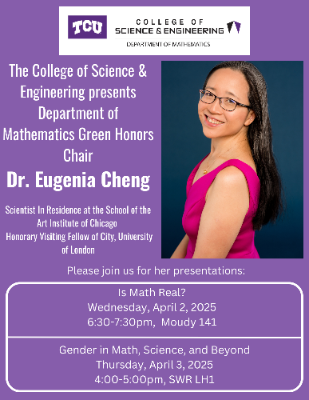
The 22nd Annual Michael and Sally McCracken Student Research Symposium will be held on April 25, 2025, from 11:30 a.m. - 3:45 p.m. in Tucker Technology. The SRS offers undergraduate and graduate students practical experience in giving presentations in a professional yet relaxed setting. It’s a fun way for students, faculty and staff to learn about the research being done in the different departments of the College of Science & Engineering. There will be an awards ceremony following the symposium from 4:00 p.m. - 5:30 p.m. in Sid W. Richardson in LH1.
The Poster Demo occurs on Friday, Feb. 14 from 3:00 p.m. - 4:00 p.m. in Sid W. Richardson 238. Please note additional dates and deadlines essential to your successful participation at https://srs.tcu.edu/about/important-dates.
We encourage everyone to come by the SRS and support our students’ research efforts!
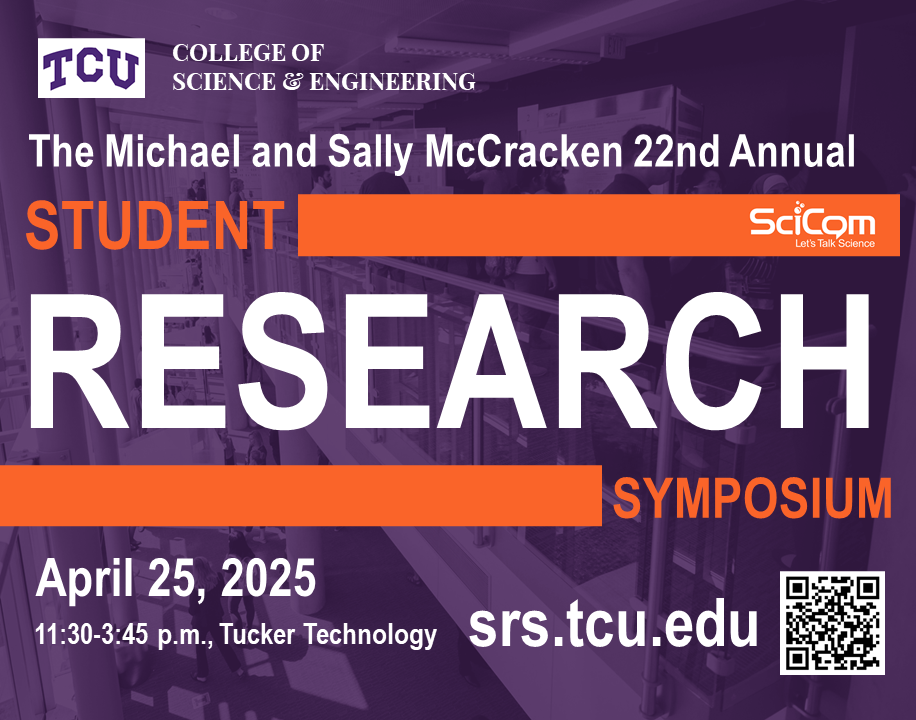
Join us Monday, March 3, in Sid Richardsoon, Lecture Hall 1, from 5:15pm for Networking and 6pm for the Talk from Deborah Sacrey, AAPG President, CEO Auburn Energy to hear about Unlocking the Secrets of the Sub-Surface with Machine Learning.

DATE: Tuesday, February 25th
TIME: 4pm - 6pm
LOCATION: Tucker Technology Center in the Basement
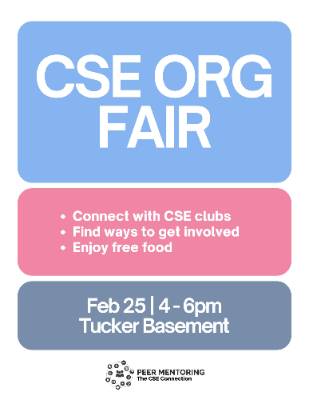
Whether you're an Engineering, Geology or Nutritional Sciences Major Apply Now for
the 2025-2026 academic year scholarships.
Deadline April 3, 2025. More that 3.6 million in scholarships available through the
scholarship protal.
TWO-STEP APPLICATION PROCESS FOR MERIT AND/OR NEED-BASED SCHOLARSHIPS:
1. Complete the 2025-2026 General Scholarship Application
2. Complete additional questions for “recommended opportunities” on your personalized
dashboard
Visit tcu.academicsworks.com TODAY!
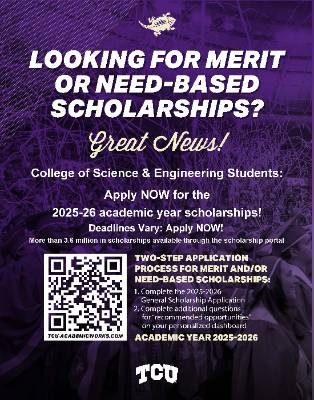
The College of Science & Engineering is proud to announce that TCU’s Pre-Health Professions Institute, with cross-campus interdisciplinary support, has been selected for the $60,000 Interfaith America Faith and Health Campus Grant. This grant will support initiatives that integrate interfaith understanding into health-related curricula, build partnerships with community organizations, and enhance understanding of religion as a social determinant of health.
Through this funding and partnership with the Department of Religion and the John V. Roach Honors College, the Pre-Health Professions Institute will continue to advance its mission of equipping undergraduate students with the essential skills to emerge as competent, caring, and compassionate healthcare leaders.
Two students from TCU’s Department of Physics & Astronomy have been recognized with Outstanding Poster Awards at the Texas Section of the American Physical Society (TSAPS) fall meeting.
Devansh Kalluholamatham, an undergraduate student '25, presented his work titled Synthesis and Characterization of α-GaOOH Microparticles as a Platform for Investigation of Antibacterial Mechanisms. His research explores innovative materials with potential applications in antibacterial science.
Anthony Gerg, a graduate student '28, earned his award with the poster Quantifying Spatial Heterogeneity of Syncytial Cells using Alpha Shapes, demonstrating advanced analytical techniques in cellular biology.
These awards highlight the high level of scholarship and dedication of our students and showcase TCU’s commitment to fostering scientific excellence. Congratulations to Kalluholamatham and Gerg on their achievements!
Kelly Brice, Ph.D., ’23, a former graduate student of Mike Chumley, Ph.D., and Gary Boehm Ph.D., recently published a paper in the Journal of Neuroinflammation entitled “Chronic sleep loss alters the inflammatory response and BDNF expression in C57BL/6J mice.” Combined with her previous work at TCU's Neurobiology of Aging Labs, Brice has demonstrated that sleep loss negatively impacts the immune system and production of neural growth factors, leading to altered animal learning and early markers of Alzheimer’s disease.
Brice is now conducting postdoctoral research at Rice University, where under the direction of Christopher Fagundes, Ph.D., she is exploring the relationship between negative affective states, emotion regulation, and how changes in psychological state can impact immune function and disease risk.
Instructor II of Biology, Mark Demarest, Ph.D., published a college-level textbook titled Organisms to Ecosystems: Biology Lessons for the Flipped Classroom. This textbook is "an exploration of organismal biology for science majors that is especially designed for students to engage in on their own, thereby freeing class time to check and supplement their learning."
Congratulations to four CSE professors on their selection as finalists for the 2024 Campus Awards!
Chancellor’s Award for Distinguished Achievement
The Chancellor’s Award for Distinguished Achievement as a Creative Teacher and Scholar recognizes extraordinary creative teaching and scholarship.
Finalist: Matt Chumchal, Ph.D., Professor of Biology and Director of Pre-Health Professions Institute
Ferrari Award
The Michael R. Ferrari Award for Distinguished University Service and Leadership was established by the TCU Board of Trustees to honor the former chancellor and recognize the extraordinary situational leadership accomplishments above job or position expectations of a faculty or staff member.
Finalist: Magnus Rittby, Ph.D., Professor of Physics and Astronomy
Wassenich Award
The Wassenich Award for Mentoring in the TCU Community was established by Mark and Linda Wassenich to celebrate this defining characteristic of TCU for many generations. Alumni and students may nominate faculty and staff members who serve as role models, advisors and guides to students, and the winner is chosen by a committee of primarily faculty and staff.
Finalist: Susan Staples, Ph.D., Associate Professor of Mathematics and Actuarial Program Director
Maryrose and Dan Short Award
The Maryrose and Dan Short Award for Teaching Excellence recognizes excellence in teaching and is specifically focused on exceptional untenured (tenure-track or non-tenure track), full-time faculty members with five years or less at TCU. Nominations from colleges and schools are submitted to academic deans who select the top candidates to submit to the provost for final selection.
Finalist: Derek Tomlin, Ph.D., Instructor I of Mathematics
 Congratulations to Efstathios (Stathis) Michaelides, Ph.D., W.A. "Tex" Moncrief, Jr. Founding Chair of Engineering, for receiving the
James Harry Potter Gold Medal from the American Society of Mechanical Engineers (ASME)!
Congratulations to Efstathios (Stathis) Michaelides, Ph.D., W.A. "Tex" Moncrief, Jr. Founding Chair of Engineering, for receiving the
James Harry Potter Gold Medal from the American Society of Mechanical Engineers (ASME)!
He is honored for pioneering contributions in thermodynamics that have led to advances in geothermal energy, applications of the exergy concept, numerical methods and energy transition, as well as for advancing thermodynamics research, education and publishing.
Michaelides says, "Of all the other awards I have received, this has a deep personal meaning, because my Ph.D. advisor (the late Professor Kestin of Brown University) received the same award in 1981. The torch has been passed to TCU."
Morgan Kiani, Ph.D., professor in the engineering department, will be joining the Institute of
Electrical and Electronics Engineers (IEEE) as an Editorial Board member of the 2024 Teaching Excellence Hub Steering Committee.
This esteemed committee features volunteer Board members from both the IEEE Education
Society and the IEEE Educational Activities Board to provide professional development
resources for those teaching engineering, computing, and technology at the university
level.
IEEE is the world's largest technical professional organization dedicated to advancing
technology for the benefit of humanity.
Congratulations to the four CSE students who have been awarded the distinct honor of 2024-2025 Clark Society Scholar!
Audrey Dolt, Biology
Megan Lorch, Biology and Sociology
Emma Sullivan, Biology
Caleb Pryor, Biology
These scholars have been nominated by faculty and staff, and they represent TCU with the highest degree of character, leadership and sense of service.
To learn more about each student and the award, click here.
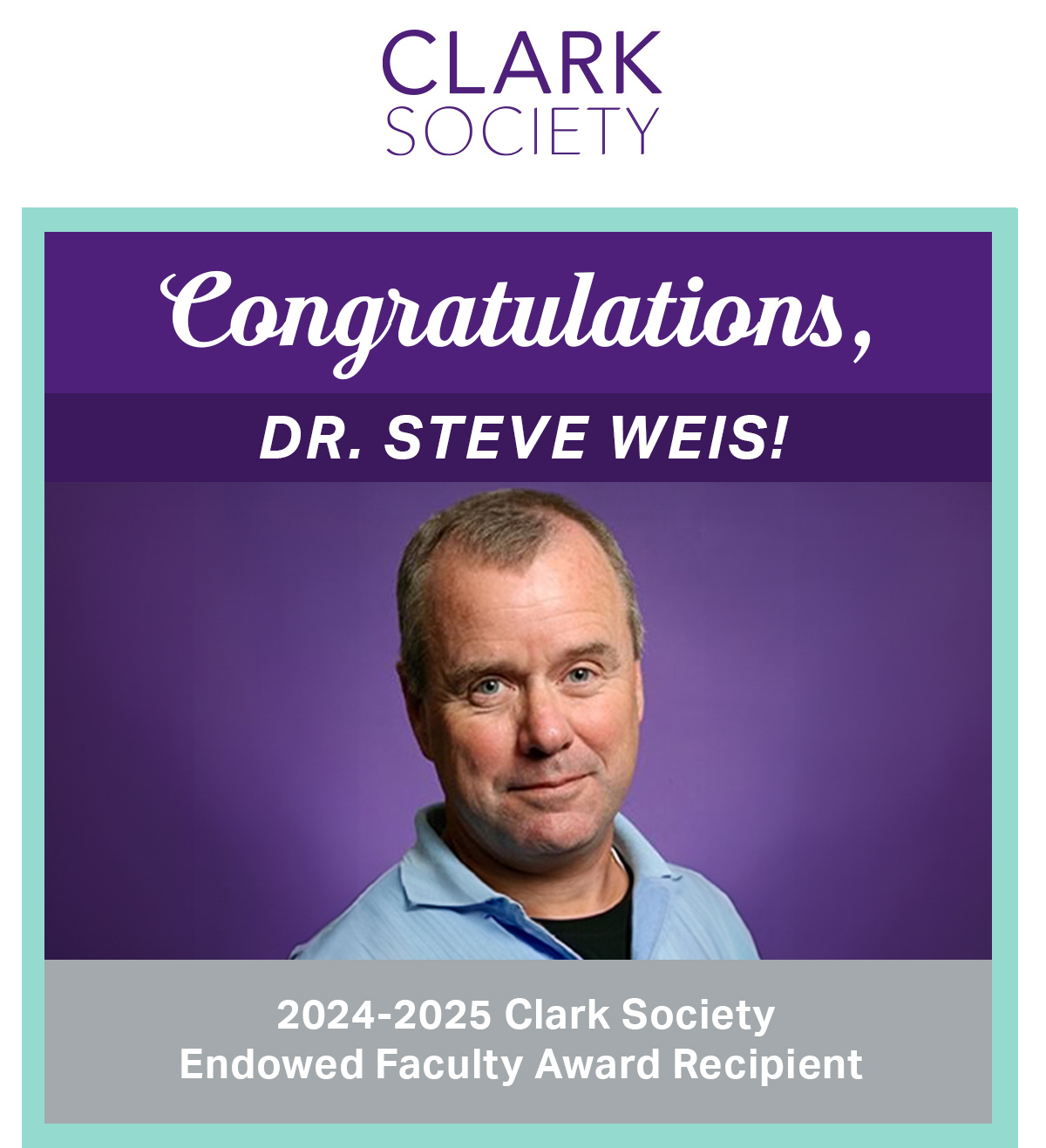 Steve Weis, Ph.D., is selected as the 2024-2025 recipient of the Clark Society Endowed Faculty Fund Award. Weis is a professor of engineering and chair of the engineering department.
Steve Weis, Ph.D., is selected as the 2024-2025 recipient of the Clark Society Endowed Faculty Fund Award. Weis is a professor of engineering and chair of the engineering department.
One of his nominators said of him, “There is no one more deserving than Dr. Weis of this Clark Society Endowed Faculty Award. While his students’ success and happiness are the ultimate reward for him, or so he might say, I think it is time we recognize his incredible work here at TCU.”
Weis will use the funds to provide opportunities for engineering students to help special needs children facing assistive technology challenges, such as creating a custom forearm support to allow a child with Cerebral Palsy to eat without assistance.
The Clark Society Endowed Faculty Fund Award recognizes the incredible research and creative activities of faculty who excel as teachers and scholars and prioritize engagement with students. The award serves as an annual recognition for at least one faculty member per year with the goal of expanding the annual award to recognize the efforts of multiple faculty members across various disciplines.
Eun Hye Lee, Ph.D, earns acceptance to the prestigious Project NExT program!
Project NExT is a teaching-focused professional development program run by the MAA. Only about 80 mathematics faculty nationwide are accepted to the program each year. Dr. Lee is joining Dr. Emily Herzig, Dr. Drew Tomlin, and Dr. Derek Tomlin in CSE's cohort of Project NExTers.
 Stemming from a six year collaboration, Santa Gertrudis Breeders International awarded
Dr. Matthew Garcia with the Presidential Award. The project evaluated how crossbreeding
Santa Gertrudis cattle to Western angus based beef herds might address longevity issues
on the cow side. It also considered how these crossbred hybrids may be more environmentally
compatible with western rangelands variable forage availability, high elevations and
variable weather conditions. The project was able to prove that these hybrids were
more production system compatible, more efficient (on both range and in the feedlot),
and that they had similar carcass characteristics to their angus counterparts while
using less feed to achieve high quality final beef products. Congratulations, Dr.
Garcia!
Stemming from a six year collaboration, Santa Gertrudis Breeders International awarded
Dr. Matthew Garcia with the Presidential Award. The project evaluated how crossbreeding
Santa Gertrudis cattle to Western angus based beef herds might address longevity issues
on the cow side. It also considered how these crossbred hybrids may be more environmentally
compatible with western rangelands variable forage availability, high elevations and
variable weather conditions. The project was able to prove that these hybrids were
more production system compatible, more efficient (on both range and in the feedlot),
and that they had similar carcass characteristics to their angus counterparts while
using less feed to achieve high quality final beef products. Congratulations, Dr.
Garcia!
Congratulations to the CSE Honors Students nominated as Boller Awards Finalists:
Paige Anderson, Departmental Honors in Computer Science – “Transparent Tuition: Finding your Financial Fit”, Advised by Dr. Michael Scherger
Aleah Appel, Departmental Honors in Biology – “Mercury Contamination of Arctic Terrestrial Insects”, Advised by: Dr. Matt Chumchal
Jackson Bonnell, Departmental Honors in Chemistry & Biochemistry – “Characterization of Fe-Py2N2 Azamacrocycles as C-C Coupling Catalysts”, Advised by Dr. Kayla Green
Hiep Nguyen, Departmental Honors in Computer Science – “From Gestures to Words: American Sign Language End-to-End Deep Learning Integration with Transformers and Mediapipe”, Advised by Dr. BingyangWei
Sheridan O'Coyne, Departmental Honors in Biology --- "Repurposing Drugs: Ritanserin as a Potential Novel Antibiotic", Advised by Dr. Shauna McGillvray
Honorable Mentions:
Caroline Crittell, Departmental Honors in Chemistry & Biochemistry – “An Investigation of Pyclen Metal Chelator Release on the Aggregation of Amyloid Beta”, Advised by Dr. Jeff Coffer
Emily Smith, Departmental Honors in Psychology – “Comparing the Effects of Blocking and Interleaving Schedules on Student Learning of the Usage of Imperfect and Preterite Spanish Grammar Tenses”, Advised by Dr. Uma Tauber
Congratulations to the two CSE faculty members, Dr. Emily Herzig for the Deans’ Award for Teaching and Dr. Kat Barger for the Deans’ Award for Research and Creativity, on their nominations.
The Deans' Teaching Award honors TCU faculty members who are nominated by their peers for demonstrating exceptional dedication to teaching and teaching-related activities. The Deans’ Award for Research and Creativity honors TCU faculty members for producing the highest quality research or creative activity recognized nationally or internationally.
These are two of the highest university-wide awards at TCU. All deans meet to deliberate on the nominees and vote for the three winners for each award.
Each award winner receives $2,500.
Winners will be announced May 1.
Chemistry student Camryn Gloor ('22) was awarded a prestigious NSF Predoctoral Fellowship.
Gloor is currently at UNC working with Dr. Wei You on 2D hybrid perovskites. The overall
goal of her research is to study how varying the organic cation within these materials
can unlock novel optoelectronic properties. She focuses on understanding the chiroptical
properties and chirality transfer mechanisms.
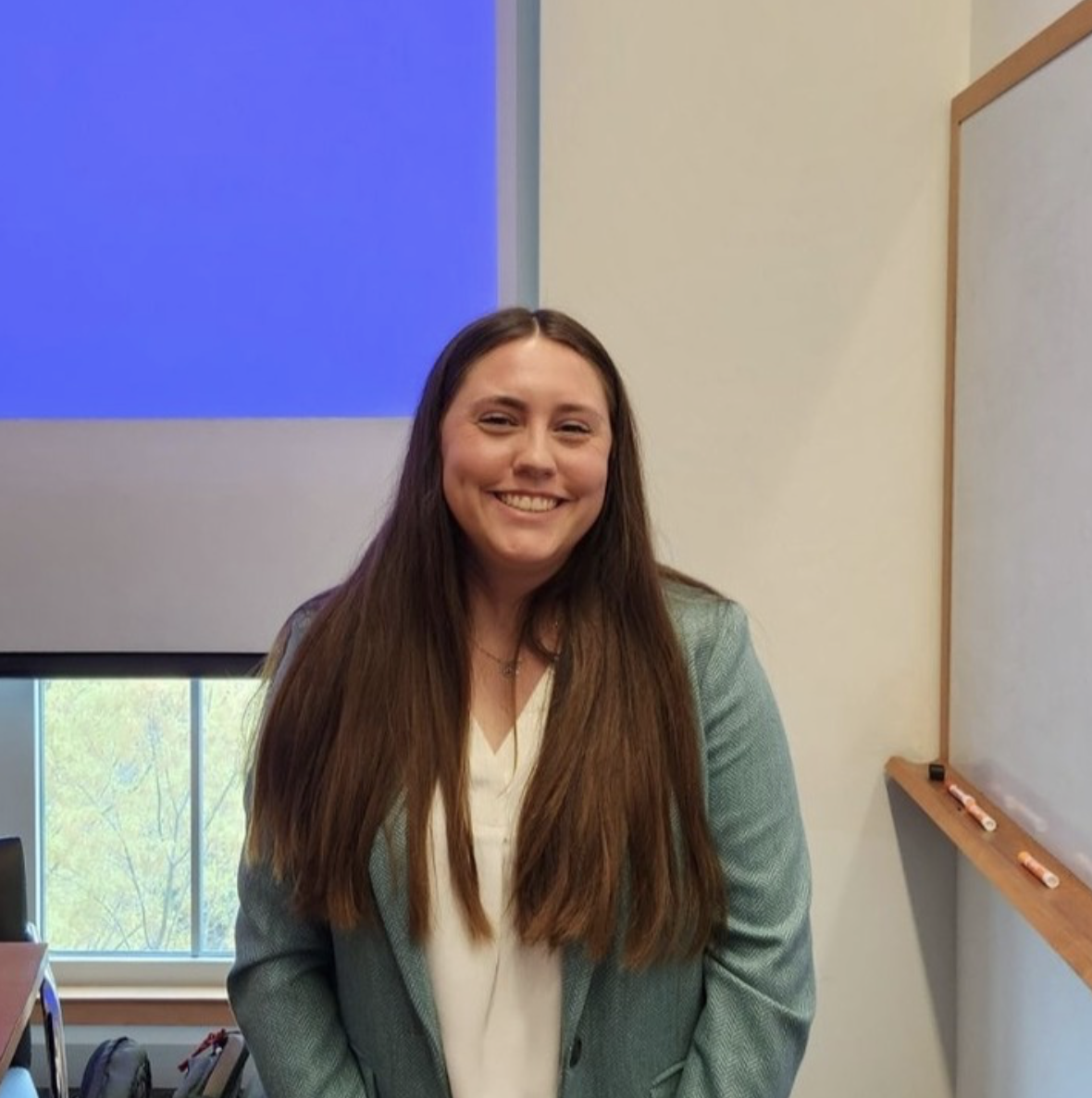
About NSF Predoctoral Fellowship:
The purpose of the NSF Graduate Research Fellowship Program (GRFP) is to help ensure the quality, vitality, and diversity of the scientific and engineering workforce of the United States. A goal of the program is to broaden participation of the full spectrum of diverse talents in STEM.. The program recognizes and supports outstanding graduate students in NSF-supported science, technology, engineering, and mathematics disciplines who are pursuing research-based master’s and doctoral degrees at accredited United States institutions.
As the oldest graduate fellowship of its kind, the GRFP has a long history of selecting recipients who achieve high levels of success in their future academic and professional careers. The reputation of the GRFP follows recipients and often helps them become life-long leaders that contribute significantly to both scientific innovation and teaching. Past fellows include numerous Nobel Prize winners, former U.S. Secretary of Energy, Steven Chu, Google founder, Sergey Brin and Freakonomics co-author, Steven Levitt.
SciCom held its annual 3 Minute Thesis (3MT) competition. Congratulations to Peyton Harper, a second year MS Environmental & Sustainability Sciences student, who won First Place and People's Choice presenting her research "Flight for Survival: Ensuring Water Access for Bats," and Runner Up Stephanie Villaire, a third year Ph.D. Experimental Psychology student, presenting her research "Making Research Accessible: The Online Prevention Education Now Program."
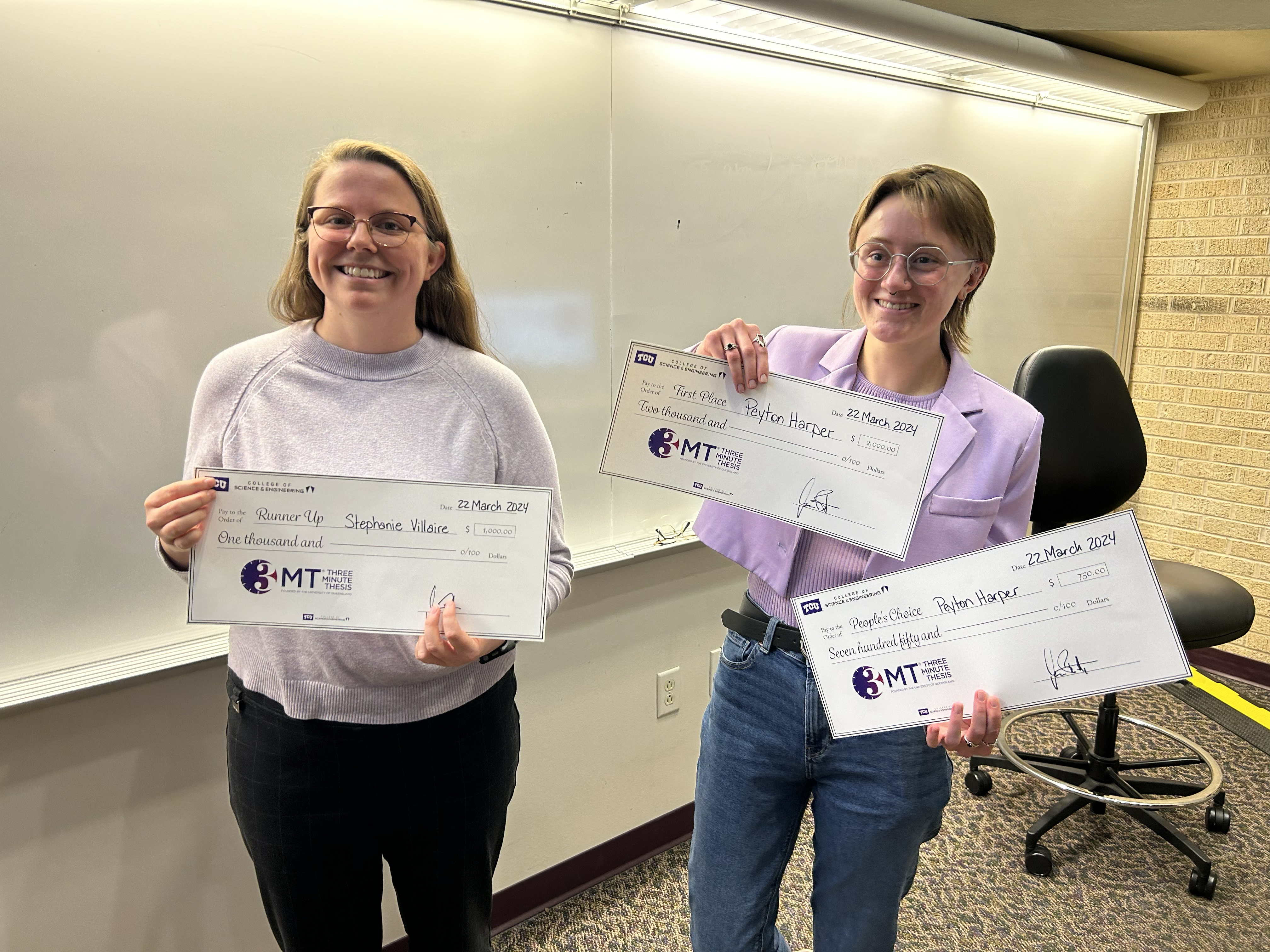
Three Minute Thesis (3MT®) is a research communication competition developed by The University of Queensland, which challenges research graduate students to present a compelling oration on their thesis/dissertation topic and its significance in just three minutes while using language appropriate for a “non-specialist” audience.
Click here to learn more about 3MT and view past winners.
Members of the Williams lab attended the Texas Conservation Symposium in Georgetown, TX and the Texas Wildlife Society meeting in Houston, TX. At the Texas Conservation Symposium, Ulysses Oles (BS Biology 2022, MS 2024) presented a poster stemming from his thesis research titled “Employing a new testing method for identifying fluridone resistance in Hydrilla”, which describes his efforts to identifying fluridone resistant populations of Hydrilla, an invasive aquatic plant, using novel molecular approaches. At both meetings, Kira Gangbin (PhD 2027) presented a poster titled “Using targeted poisoning of red imported fire ants to improve Texas horned lizard habitat”, which describes work focused on conserving populations of Texas horned lizard habitat by reducing fire ant populations. Kira received the best poster presentation award at the Texas Conservation Symposium and the 2nd place best graduate student poster presentation award at the Texas Wildlife Society meeting.
Congrats to Ulysses, Kira, and Dean!
It’s Stock Show time in Fort Worth. Matthew Garcia, director and Southwestern Exposition and Livestock Show Professor in Ranch Management, explained to TCU News why this legendary event has such staying power and why it is essential to the field of agriculture.
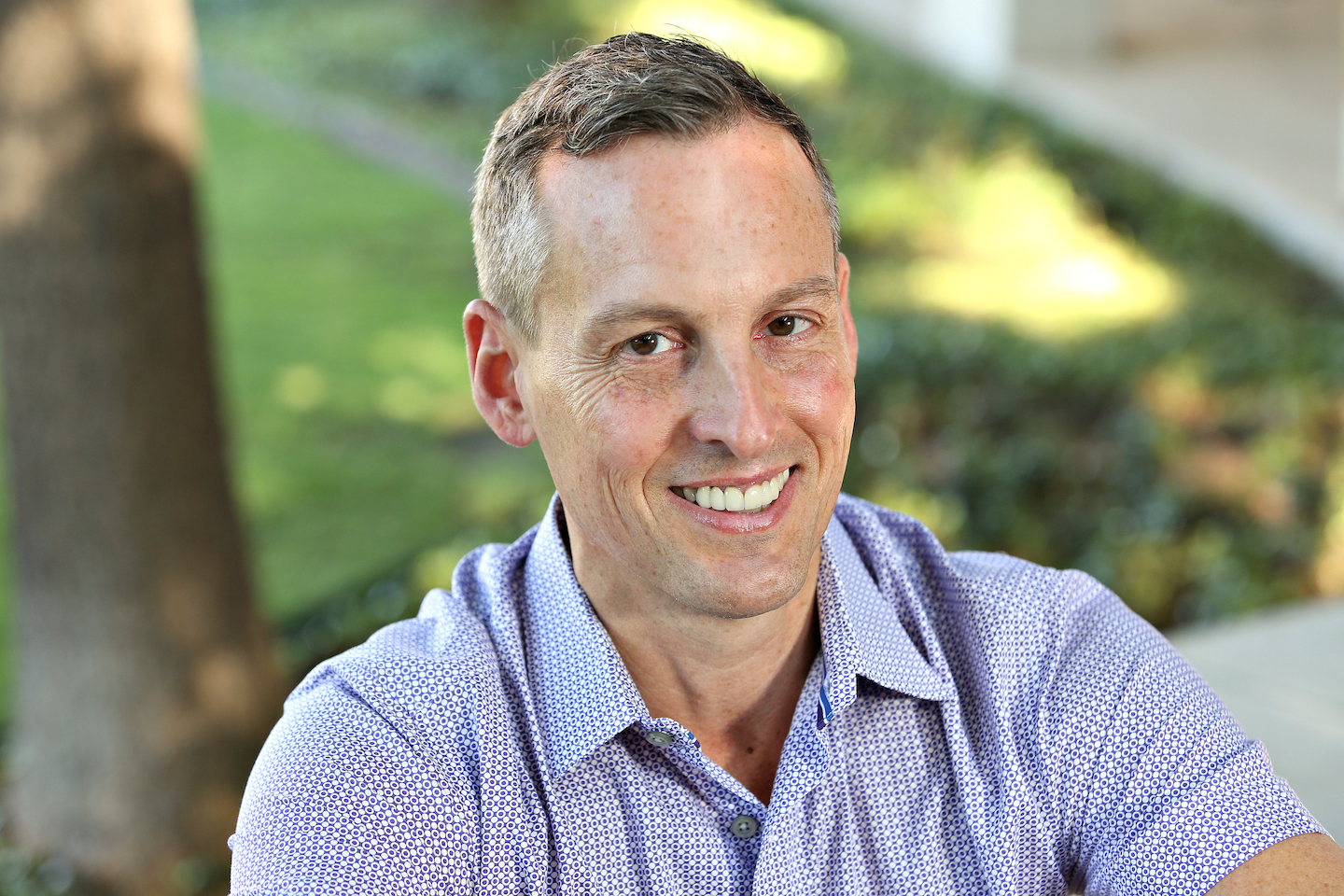
It's almost time for the 20th annual Michael and Sally McCracken Student Research Symposium on April 28 from 11:30am - 3:45pm. An awards ceremony will follow from 4 - 5:30pm in Sid Richardson LH 1. This year's keynote speaker is Dr. Elisa Marroquin, assistant professor in the TCU Department of Nutritional Sciences.
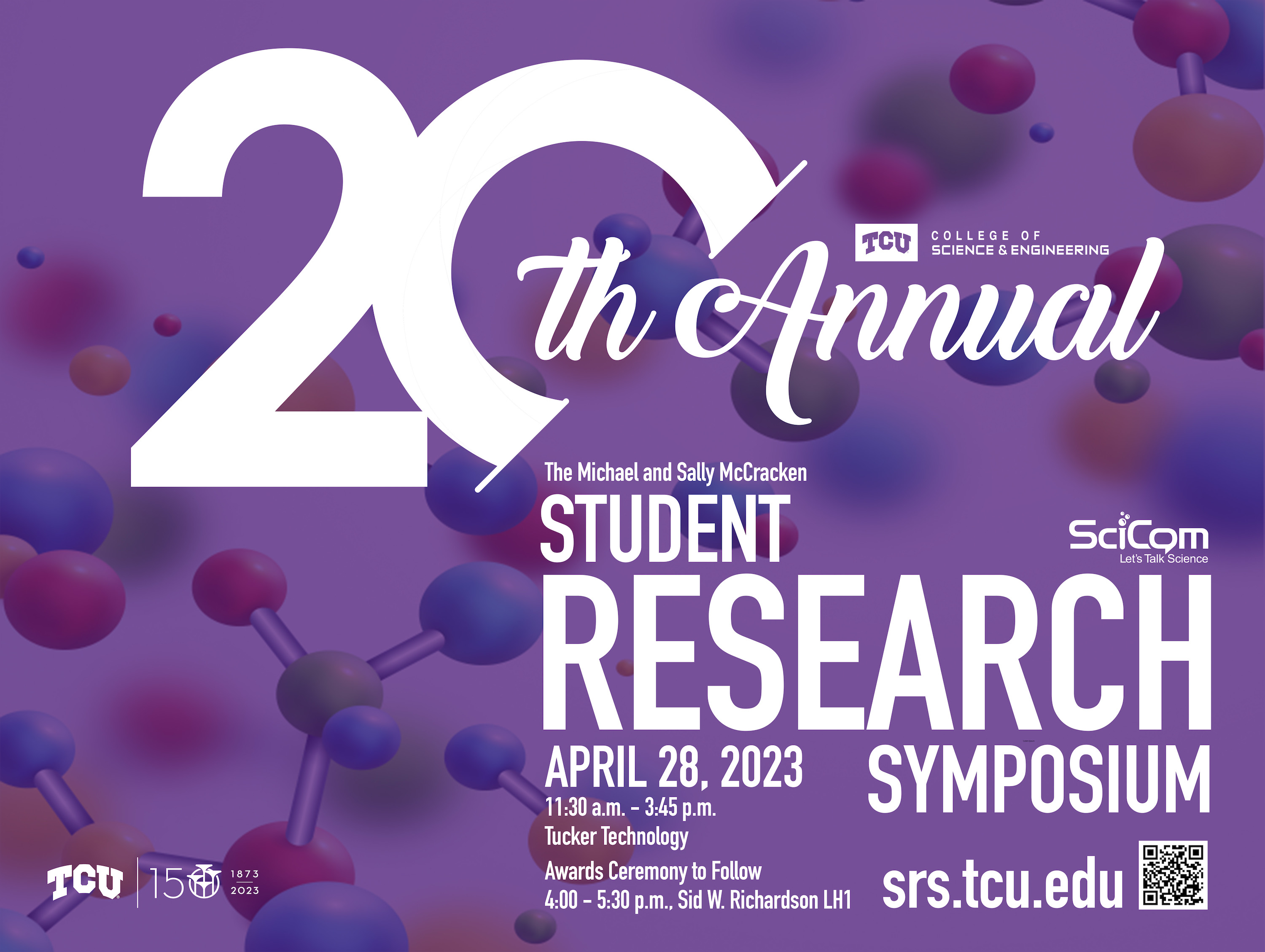
Peer Mentors will support prospective, first-year, returning, transferring, and underrepresented students in their transition to the CSE community by providing resources to increase their success and engagement with the University.
After two years of being shut down due to COVID, the Oscar E. Monnig Meteorite Gallery once again opens its doors. Visitors to the Monnig can once again learn how to identify a meteorite, enjoy hands-on encounters with different types of meteorites, create their own terrestrial impact crater, and have an “out-of-this-world” experience.
In honor of National Engineers Week, guests are invited to hear Dr. Charles Camarda,
astronaut and engineer, give a lecture on Feb. 21 from 7-9 p.m. in SWR Lecture Hall
1.
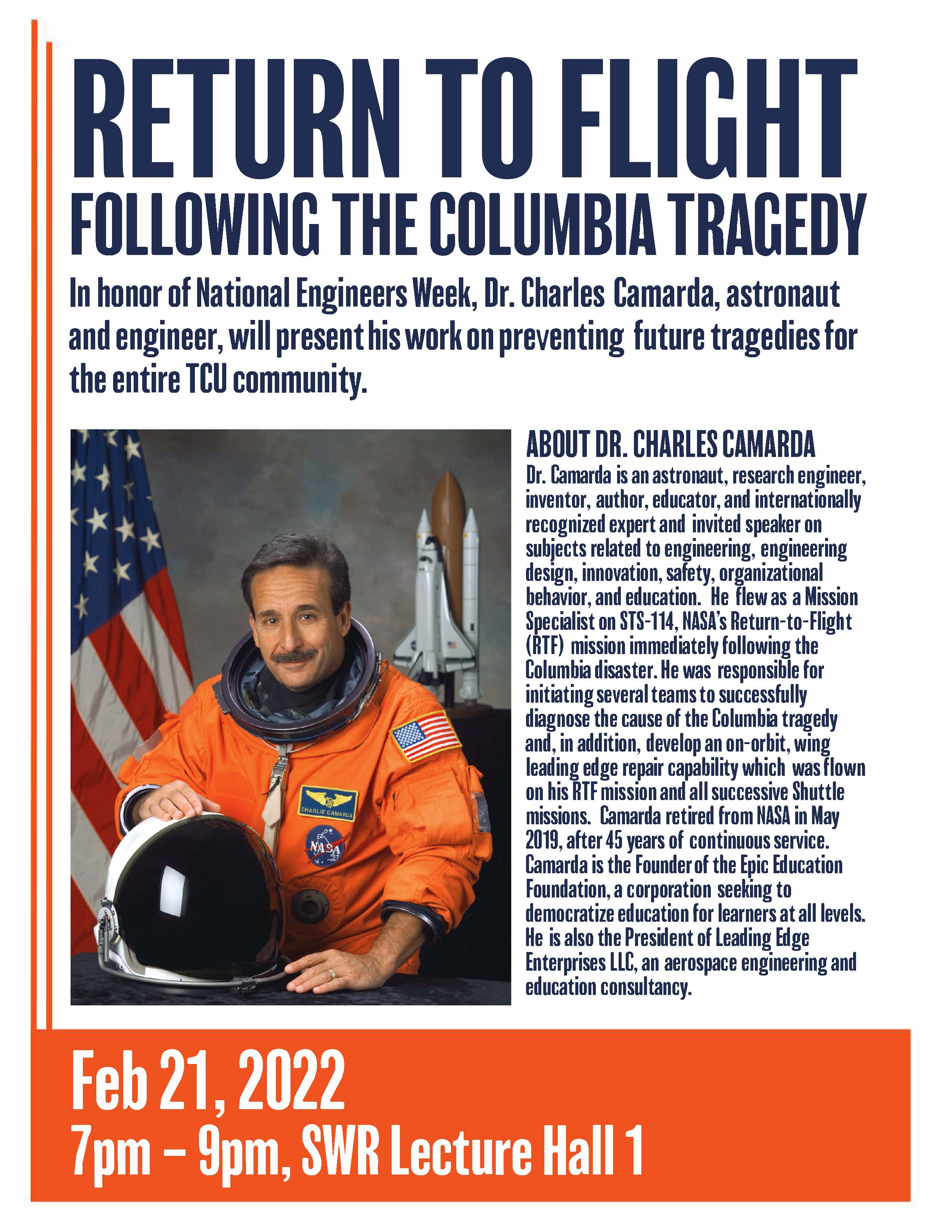
A Survey of Whiskey program is part of the TCU Whiskey School led by Dr. Eric Simanek.
Don't miss the opportunity to learn more about this spirit on Jan. 27 from 7-9 p.m.
Location TBD. Sign up here: Sign up here: https://www.campusce.net/tcu/course/course.aspx?catId=430.
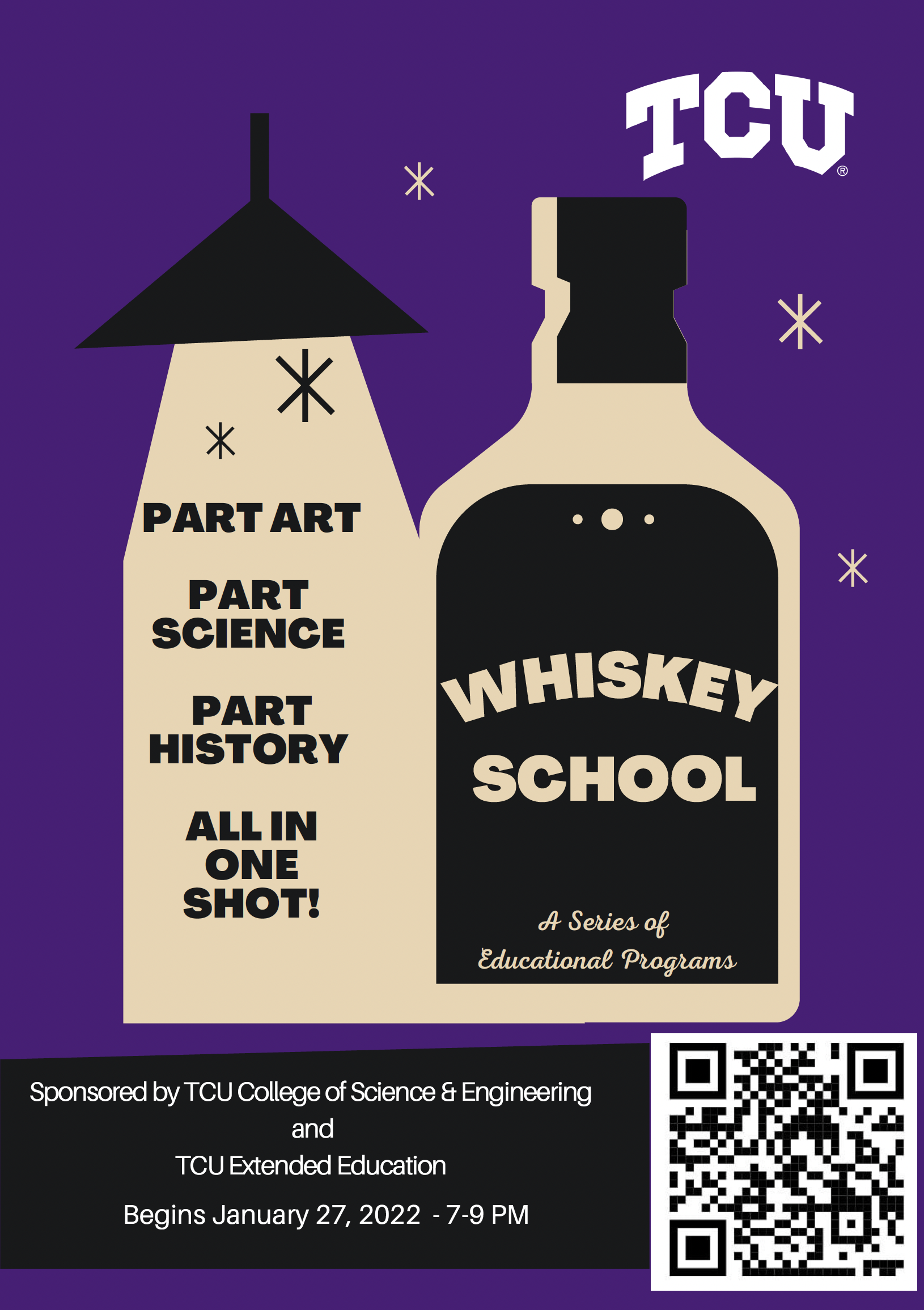
Come celebrate the accomplishments of first-generation college students. Attendees
will receive treats and have the opportunity to participate in giveaways and interact
with other first-gen students.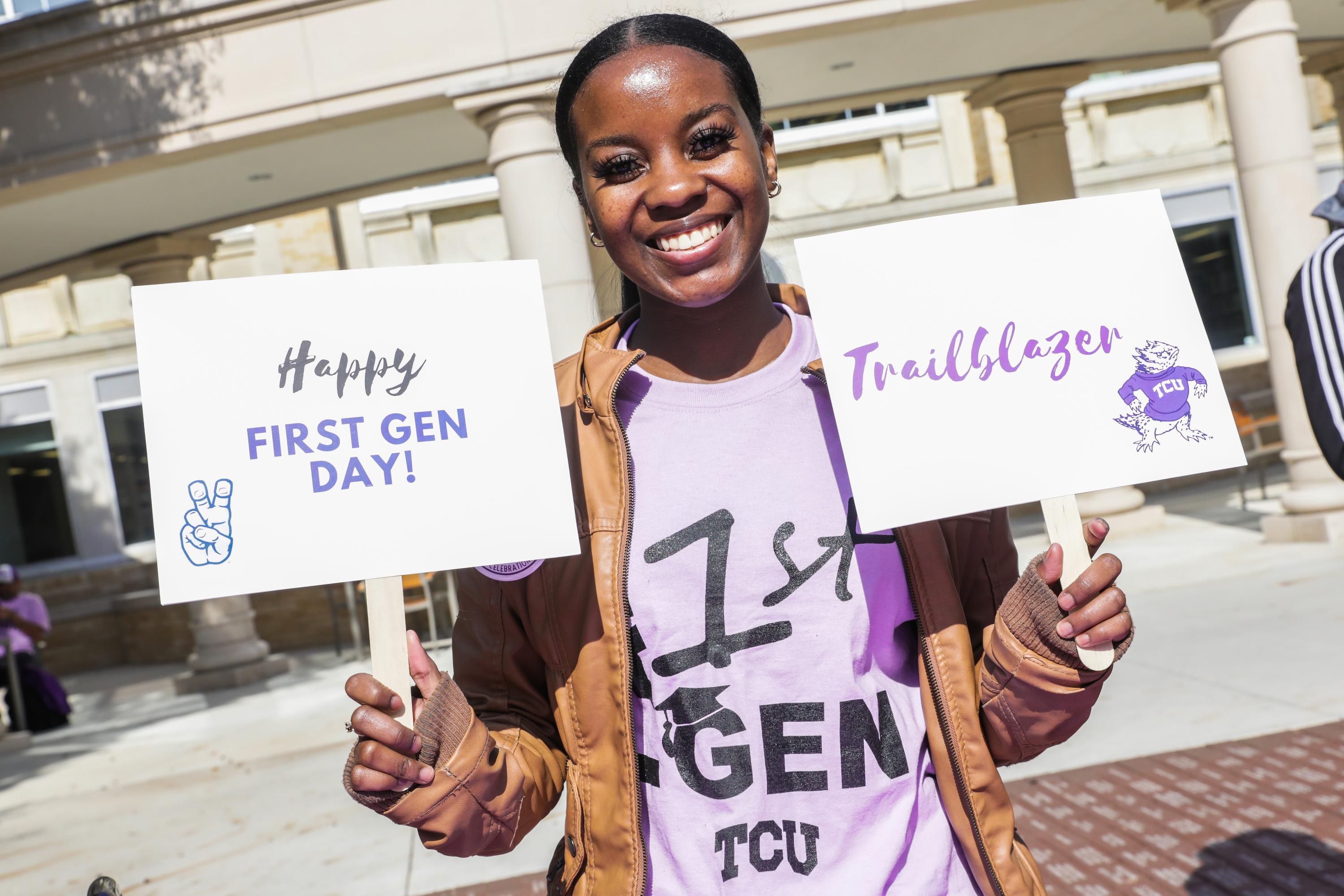
The College of Science & Engineering invites you to participate in TCU Gives Day on Oct. 26. This year, if the CSE receives gifts from 100 donors during TCU Gives Day, an additional $26,000 in challenge gifts will be unlocked thanks to the generosity of Sally and Vince Burkett and Marvin Ivey ’79 and his wife Cynthia. Gifts to CSE allow us to broaden the scope of student research, thus creating a stronger, more innovative, and more globally connected college. GIVE NOW: https://tcugivesday.tcu.edu.
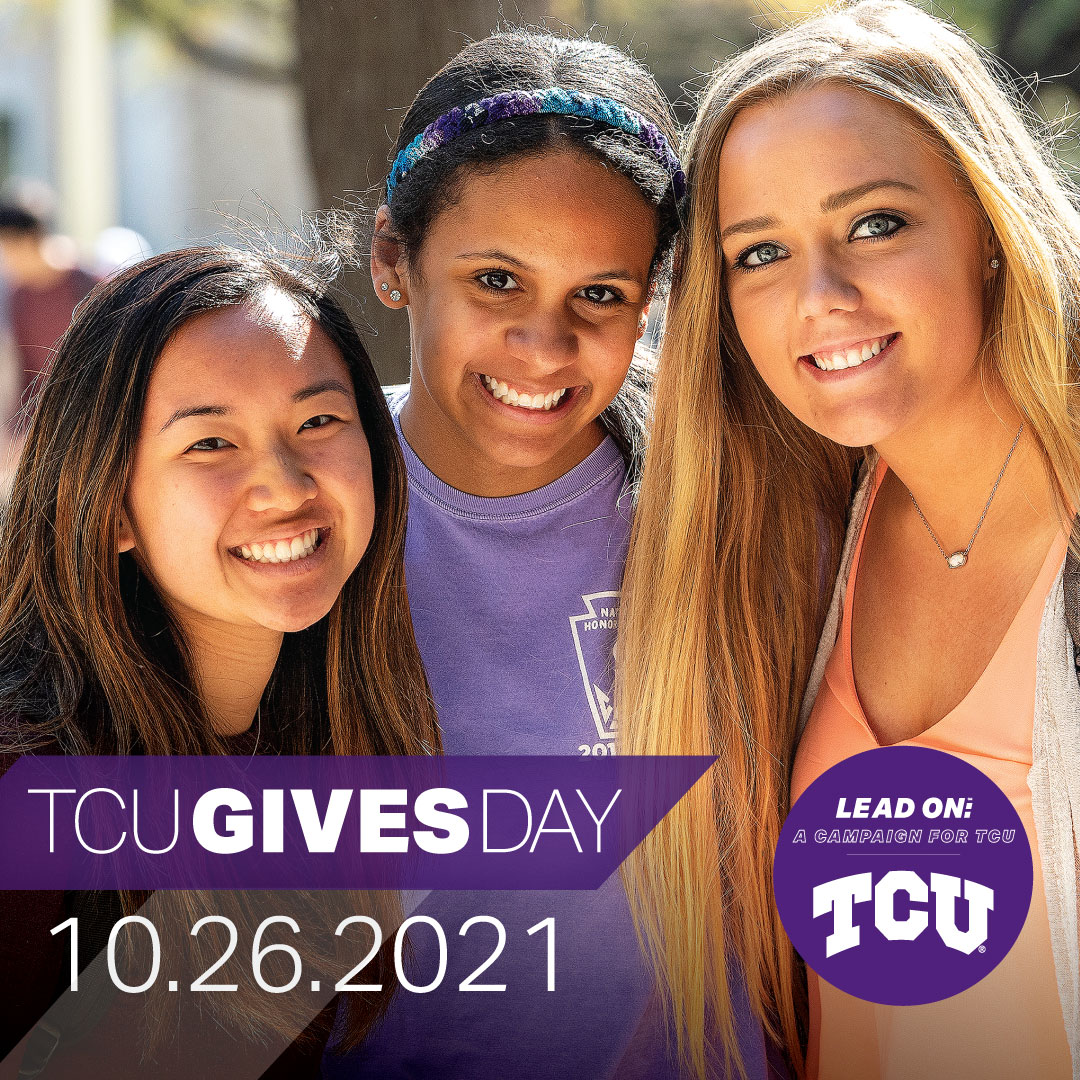
The Geology Department is very pleased to announce an occasional series of talks on geologic themes. All are welcome, whatever the heterogeneity of their academic journeys.
The Earth is the omnipresent essential backdrop to all of our lives, and it behooves us to understand its habits and idiosyncrasies, its moods and challenges, and to enjoy conversations between humankind and Earth, conversations that can be both symbiotic and Socratic.
Accordingly, the Geology Department at Texas Christian University will offer an irregular series of talks on eclectic themes that explore the human and scientific interfaces of our home planet.
If you have to miss, the talks will be available in PDF format.
The first talk, given by the Moncrief Chair holder was: Clans and Conglomerates, Cliffs and Conglomerates. Canto the First.
The second will be: The Old Red Sandstone a Fishy Tail.
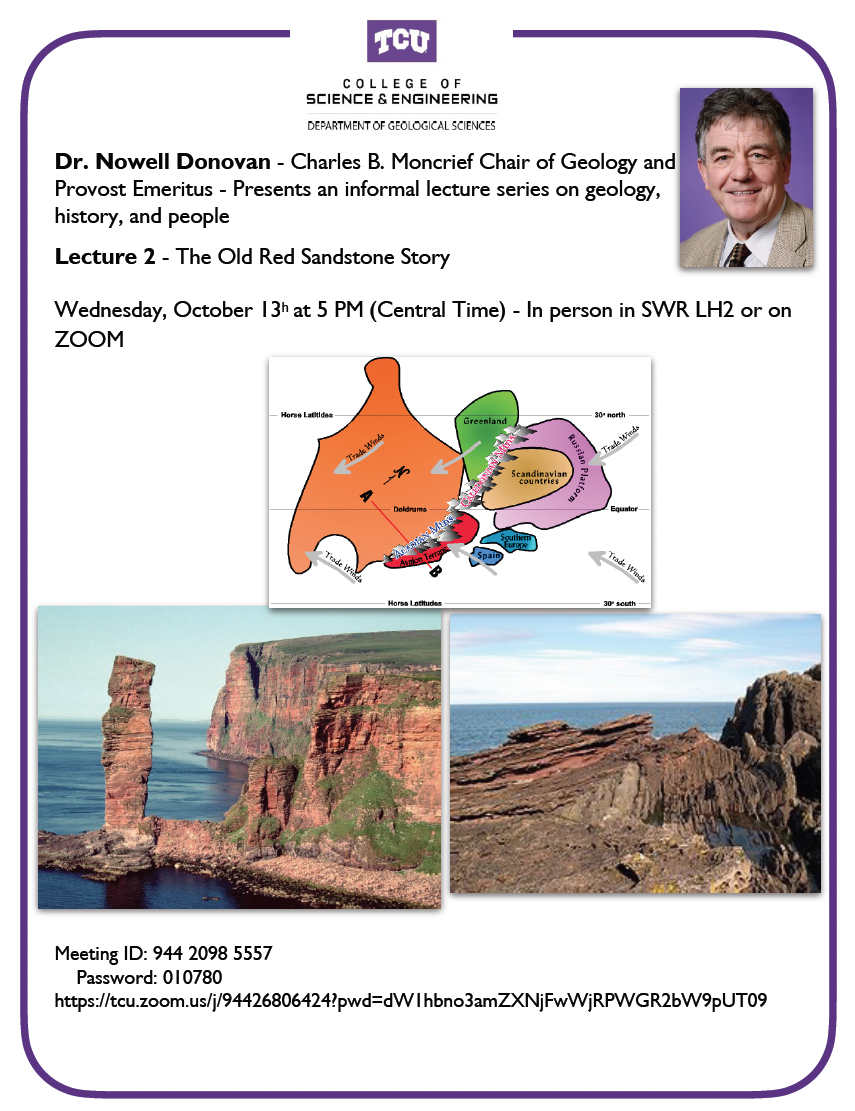
The race is on to save the rhino! Don't forget to sign up for the 5th Annual TCU Rhino Run featuring a 5K and 1K Kid's Race supporting rhino conservation. Start time is 8:15 a.m. on Sept. 19 at Frog Alley. Registration is $30 in advance and $35 on site. Register here now.
The CSE Testing Center is open Monday - Friday, 9 a.m. - 3 p.m. in Tucker Technology Center, room 246.
The interdisciplinary collaboration provides new opportunities for the TCU Energy Institute to grow and evolve in its important role for students, faculty and energy professionals. "This collaboration will further develop the interdisciplinary efforts of the Energy Institute's programs and activities," said Phil Hartman, Dean of the College of Science & Engineering. "I am grateful for the exceptional leadership of Richard Denne, and to his predecessor Ken Morgan, who helped found and guide the Energy Institute. I look forward to this new relationship and an exciting future."
Matt Chumchal, professor and director of the Pre-Health Professions Institute, received the Advisor of Year award by The Texas Association for Advisors of Health Professions (TAAHP) on February 5. The TAAHP brings advisors from across the state together to improve advising for students entering health professions.
“Dr. Chumchal is richly deserving of this prestigious award,” Dean Phil Hartman said. “While the success of TCU’s Pre-Health Professions Institute depends on the dedication, competence and compassion of many faculty and staff, his leadership has been critical to its continued success. Our students are fortunate to have such an outstanding mentor and advocate. He exemplifies the teacher-scholar model, TCU style.”
Khiem Nguyen ’22 received the 2020 Upsilon Pi Epsilon (UPE) Scholarship Award last fall. He was selected for the award on the basis of his academic record, extracurricular activities and the recommendation of the UPE advisor. Nguyen is an international student from Vietnam. He transferred to TCU from Tarrant County College (TCC) in fall 2018.
Because of Nguyen’s academic and research achievements, he decided to join UPE. Liran Ma, associate professor, and Donnell Payne, associate professor and department chair, recommended that Nguyen apply for the UPE scholarship.
Nguyen has a true passion for computer science. “I love science and computers in general, and I enjoy figuring out how things work,” Nguyen said. “Coding is the most interesting aspect to me because of the unlimited possibilities. That is a big reason why I chose to study computer science, and I love it.”
After coming to TCU, Nguyen added math as a second major. “I think math is fundamental for computer science students. Implementing algorithms in programming requires basic, and sometimes advanced math skills,” Nguyen said.
Currently, Nguyen is working with Ma, Associate Professor Ze-Li Dou and research assistant Kien Nguyen on an AI2GO research team. The team is researching an artificial intelligence (AI) application that can play a complicated Chinese game called Go. “I believe that AI is important and hope that our research can deliver a small contribution to the community,” Nguyen said. “Real world work in the industry is fascinating to me, and I look forward to working in the field after graduation.” Nguyen appreciates the opportunities that TCU has afforded him as a student. He values the relationships he has made with instructors, as well as the access to resources within the computer sciences department.
Astronomers at TCU are researching the mysteries of galaxies. A team of faculty and students, led by Associate Professor Kat Barger, is seeking to better understand how our own galaxy is able to continuously form stars and planets without running out of gas. This team is using observations taken with the Green Bank Telescope to decipher how well a massive gas cloud is traversing the Milky Way’s defensive gaseous hot halo that surrounds it. “Simulations keep getting better, with higher resolution and more physics, but they are still poorly constrained. We still don’t know the details of how exactly these clouds break up, but these observations will help,” said Barger.
This high velocity cloud, known as Complex A, carries with it enough material to form over 2 million suns and countless planets. "The incredible Green Bank Telescope allowed us to map this large gas cloud in great detail down to the minute undulating features being produced by its path onto the Milky Way's disk," said David Nidever, coauthor from Montana State University, on their 2020 study. With these observations, they are finding that gas instabilities are forming on the surface of this gas cloud, which are causing it to break up and dissolve into the Galactic halo; not all of its gas will reach the Milky Way’s disk to be uses as the building blocks of new solar systems.
Barger presented her recent research findings at the American Astronomical Society virtual conference. Cannon Huey-You, 15-year-old engineering and physics and astronomy major at TCU, also contributed to this research project beginning when he was in high school (at age 9). He is listed as the third author on the recent publication. Watch this video to learn more about their research.
Each winter, pre-health students typically host a holiday event for patients and their families associated with the Heroes for Children organization. Heroes for Children helps provide financial and social assistance programs for families with children battling cancer. Due to COVID-19 restrictions, this year students are partnering with Cook Children’s Hospital and spreading holiday cheer by packaging holiday activities for families with Heroes for Children, a charity that helps kids battling cancer. The kits will include items such as: candles, crafting materials, fleece blankets, DVDs and popcorn, cookie mix and cookie cutters, board games and candy.
The students who participated in holiday kit assembly included: Payton Aydelott, Rigo Garcia, Ashlyn Laidman, Megan Ha, Chloe Ricke, Joey Mellberg, Annemarie Thompson, and Gretel Jordan.
Professor of Engineering Sue Gong received a grant in the amount of $156,000 from Florida Atlantic University, funded by the Office of Naval Research. This grant will be used to develop a compact passive imaging system that can be put on autonomous platforms to monitor marine life activities.
Apply for the Chancellor's Postdoctoral Fellowship in cognitive, educational or developmental psychology. The fellowship is designed to promote diversity and support stellar scholars who are committed to research, teaching and service. Applications due by Jan. 25, 2021. For more information or to apply, please visit chancellor.tcu.edu/postdoc or contact Dr. Whitnee Boyd at w.boyd@tcu.edu or 817-257-4158.
Kevin Knight, Saul B. Sells Chair of Psychology at TCU, Sandra Springer, Associate Professor at Yale University, and Ank Nijhawan, Associate Professor at UT Southwestern, are the principal investigators in a study entitled “Addressing risk through Community Treatment for Infectious disease and Opioid use disorder Now (ACTION) among justice-involved populations.” They received a grant totaling $11,113,030, of which TCU will receive approximately $2.5 million. This includes over $500,000 provided back to TCU as part of finance and administration, as well as indirect costs.
Their project focuses on improving HIV and Opioid Use Disorder management and implementation for criminal justice. A total of 864 criminal justice-involved participants that are being released in Connecticut and Texas will receive one of two treatments. The study has two specific aims: intervention effectiveness, related to the length of time participants continue the treatment, and implementation, which includes feasibility, acceptability, and costs of treatments. The grant will last from October 1, 2020 until August 31, 2025.
The IBR and KPICD's "LeSA" grant ("Preventing Opioid Use Among Justice-Involved Youth aas They Transition to Adulthood: Leveraging Safe Adults (LeSA)") has been awarded Years 2-5 ($4,460,305) of funding.
Mike Slattery, professor and chair of the Department of Environmental Sciences and director of the Institute for Environmental Studies, recently published the 6th edition of his textbook: Contemporary Environmental Issues.
Watch this video message about the upcoming fall semester.
We just launched this new CSE web experience. Take a look around and let us know what you think.
The ACS Women Chemists Committee named Associate Professor of Bioinorganic Chemistry Kayla Green as one of 10 recipients of the 2020 Rising Star Award. This award recognizes exceptional early to mid-career female chemists in all areas of chemistry on a national level.
Established in 2011 to help promote the retention of women in science, recipients of this award are invited to an award symposium highlighting their work at the 259th National Meeting of the American Chemical Society in Philadelphia from March 22-26, 2019. Additionally, the winners receive a stipend to cover travel expenses to the symposium.
TCU’s Institute of Behavioral Research is now a part of the College of Science & Engineering. The move stands to align similar missions and create synergy and opportunity for students.
“In my view, the IBR move to CSE is a significant administrative move that will help strengthen TCU’s academic profile and reputation, which aligns directly with the university’s first strategic imperative,” said Kevin Knight, Ph.D., professor and interim director of the Institute for Behavioral Research.
In addition to raising the university profile, Knight said the realignment will increase research opportunities for students in the CSE.
“For example, the IBR SOAR Lab (Student Overview of Applied Research) offers undergraduate students an introduction to applied research, coupled with interactive activities aimed to enhance academic skills,” Knight said. “IBR also provides students with networking and mentoring opportunities with research-interested peers, graduate students and experienced IBR research scientists.”
Phil Hartman, Ph.D., dean of the College of Science & Engineering, said he is thrilled to have IBR within the college.
“The IBR has long been one of TCU’s crown jewels,” he said. “The research funded by the National Institutes of Health that is conducted in the institute has been impactful to our society and aligns directly with TCU’s mission statement of educating leaders to think and act as ethical leaders and responsible citizens.”